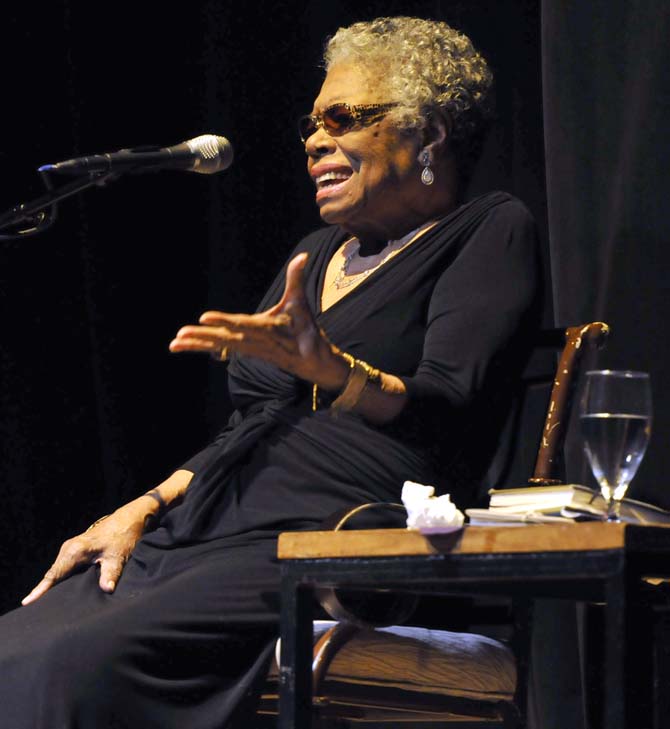An array of different faces of various races gathered in a buzzing LSU Student Union Theater on Tuesday night for an unforgettable evening with Maya Angelou during Black History Month.
A lively bunch of young men and women, including the LSU Gospel Choir; Jonosha Jackson and Eric Couto, winners of the Mic with Maya poetry slam; and a step show by representatives of the National Pan-Hellenic Council at LSU commenced the event by paying tribute to the civil rights author and activist.
By the final note of the Gospel Choir’s “We Shall Overcome,” the audience was brimming with anticipation to greet Angelou, who last visited the University 20 years ago.
The curtain rose and Angelou sat in a wooden chair, soulfully singing, “When it looked like the sun would not shine anymore, God put a rainbow in the clouds” — a line influenced by Genesis in the Bible.
It rained so unrelentingly that people thought the downpour would never cease, so God put a rainbow in the sky to ease their worries, Angelou said. But a 19th century African-American lyricist said the rainbow wasn’t simply placed in the sky but in the clouds, she explained.
“We know the suns and moons and stars and all sorts of illuminations are always in the firmament, but clouds can lower and lower so that the viewer cannot see the light,” Angelou said. “But if the light is put right into the clouds, that means in the worst of times, in the meanest and most threatening of times, there’s a possibility of seeing hope.”
The University is a rainbow in the clouds because it is an opportunity for some students to be the first in their family to attend such an institution, she said.
“We have had rainbows in our clouds, and so I wanted to come here,” Angelou said. “I wanted to be here. I wanted to see you. I wanted to hear you. I wanted to remind you of who you really are and that you’ve already been paid for.”
Some people today still find it difficult to see the African-American race as a marvel, Angelou said. Poetry is important in understanding the culture, and she encouraged young people to visit libraries to familiarize themselves with African-American poetry.
“You need Nikki Giovanni. You need her. You need Mari Evans. You need them. You need the poetry of the 19th century and the 20th century, and even now in the 21st. Don’t you know Jay-Z? Don’t you know that is poetry?” she asked. “Don’t you know that some of the hip-hops are poetry? You take some of those lyrics and talk about what it’s like to be black in these yet-to-be United States.”
She recited many of her favorite poems and various lines from old folk songs to remind students that they’ve “already been paid for.”
“The woman I love is fat,” she sang, “And chocolate to the bone. And every time she shakes, some skinny woman loses her home.”
A sea of laughter erupted from the crowd while Angelou chuckled herself. It’s crucial to have something to laugh at in spite of everything around you, she said.
“The truth is you have to laugh at yourself first,” she insisted. “You’re the funniest person you’ve ever met. I never trust people who don’t laugh.”
Young men and women are the best defense the country has in fighting racial oppression, Angelou said. Young people aren’t told enough that they are important and loved, she added.
She recalled the time when she reminded rapper Tupac Shakur of his worth.
Upon traveling to California to recite a poem for Janet Jackson during the filming of John Singleton’s “Poetic Justice,” she saw two men yelling at each other on the set, nearing a boiling point.
She grabbed one of the men and took him aside.
“I said, young man, excuse me. When is the last time anyone has told you how important you are? Do you know that our people stood on slave ship docks so that you could survive? Did you know that they laid in the filth of each other’s excrement so that you could survive? Do you know how much we need you?”
He began to cry, and she wiped his tears with her hands until he was calm.
Angelou later learned the man was the legendary rap artist. Shakur’s mother sent Angelou a letter thanking her for possibly saving her son’s life that day.
She then turned to the men and women in the crowd — potential poets, scientists, curers of cancer. Why not you, she asked, pointing to the audience.
“We know the suns and moons and stars and all sorts of illuminations are always in the firmament, but clouds can lower and lower so that the viewer cannot see the light. But if the light is put right into the clouds, that means in the worst of times, in the meanest and most threatening of times, there’s a possibility of seeing hope.”





